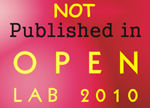So You Think You Can Neuroblog?
Real members of the Society for Neuroscience (as opposed to all those fake members with pseudonyms) can apply to be an Official SfN Neuroblogger at the 40th Annual Meeting in Chicago:
SfN Interactive: Blogging and Tweeting the Annual MeetingSfN encourages members to blog and tweet about events specific to Neuroscience 2009 while it’s happening.Interested in Serving as a Neuroblogger? Is there a Special Lecture your colleagues should not miss? Is there an interesting Poster that catches your eye? Want to gather colleagues at an SfN-Sponsored Social? Consider being a Neuroblogger.What are some of the benefits of being a Neuroblogger? Besides the possibility of greater exposure (for a limited time before, during, and after the meeting), you'll get......
- An official “SfN Social Media” ribbon to wear at the annual meeting [!!]
Yay!
But there's more! Your name will be entered into a drawing for a free iPod nano. And [better late than never] you'll have.....
- The honor of taking part in SfN Interactive’s flagship year
Internet News OutletsBona fide Internet news organizations that distribute information directly to the general public are eligible. Personal Web site writers, writers from Web sites operated by non-media companies, or Web site creators are ineligible to register as media.And their embargo policy actually prevents one from liveblogging or livetweeting:
Information from all other presentations, including lay language summaries, is embargoed until the conclusion of the relevant presentation.Strictly speaking, this means that a poster is embargoed until the end of the 4 hour session. So you're not supposed to blog about a 1 PM poster until 5 PM (although I don't know how this will be enforced). The same is true for a 15 min talk, so no quick Twitter updates until after the speaker has finished.
There are other rules and requirements as well:
- By applying to be a Neuroblogger, from October 17 to 21, you are expected to write one or more blog entries per day about activities, events, and experiences related to Neuroscience 2009 in Chicago.
- SfN cannot provide blog hosting or online content management services...
- You must be a current SfN member to submit an application.
- On the application, provide a link to your current blog(s) or writing samples from entries you've composed in the past, preferably during a previous scientific meeting.
- Selected bloggers will be categorized by theme but will not be limited to blogging about just that theme.
- Selected blog links will be posted on this Web site two weeks before the meeting and will remain until two weeks after the meeting.
...because (of course) everyone knows that #sfnthemef is Cognition and Behavior while #sfnthemec is Disorders of the Nervous System. These categories are just a wee bit difficult to parse. #sfn the meh, anyone??If you plan to tweet with your colleagues about events occurring at Neuroscience 2009, use these theme-specific hash tags:
- #sfnthemea
- #sfnthemeb
- #sfnthemec
- #sfnthemed
- #sfnthemee
- #sfnthemef
- #sfnthemeg
- #sfnthemeh
 She's smug, she's literate, she's Amber.
She's smug, she's literate, she's Amber.
Subscribe to Post Comments [Atom]













14 Comments:
A little glitch... To prove one is a current member, one needs to provide some ID information... I suspect many bloggers in the academic world would want to remain anonymous so they can say what they really think without fear of repercussion from colleagues. Let's face it, most blogs exist out of frustration with the way things are. They provide an outlet that real life does not provide. No?
Also, many colleagues have decided NOT to come to the SfN meeting this year because they realized they get very little out of the conference, given its size and the resulting information overload. I'm skeptical about adding another noisy channel on top of what already exists. When I get there, I spend at least 1.5 hrs each evening deciding what to do on the next day. Then it's a full day of running around, juggling slide sessions, poster sessions, and social interactions. In the evening we have multiple socials. These big conferences need to become virtual events.
Anonymous - You're correct that some bloggers will not apply because of the real name requirement. As for providing an outlet, here's a quote from the early days of this blog:
"The Neurocritic is happy to provide a new form of anonymous peer review, free of charge."
Anonymous Peer Review Means Never Having to Say You're Sorry
Hi Neurocritic,
Couldn't find an e-mail address for you. Many apologies for leaving the comment on this post. Just wanted to know your thoughts on the study reported here - haven't got many details on the study apart from the mention of the astrocytes and MRI signal.
http://www.sciencedaily.com/releases/2009/08/090828103926.htm
Regards
Justin
Hi Justin,
I think the ScienceDaily article is just a press release from the Academy of Finland that doesn't refer to a specific article. The idea that calcium signaling in astrocytes influences cerebral vasculature (and hence the BOLD signal) isn't new (Gordon et al. 2008).
From Wang et al. 2009:
"The notion that astrocytes can regulate vascular tone independently of synaptic transmission challenges the notion that changes in the blood oxygenation level dependent (BOLD) signal is directly proportional to neuronal activity and may thus require a reevaluation of the large body of data accumulated using functional magnetic resonance imaging (fMRI)."
Hi Neurocritic,
Thanks for the information! Will await further news from the research team
Regards
Justin
I am SO J! I just wrapped up at the 31st international ethology meeting and was the only blogger there - live blogging and tweeting. It seems no one else at the meeting understood what blogging/SM was and why it rocked.
If I were a neuro scientist I would be ALL over that. I need the exec board of your society to contact all of my member societies - animal behavior, SICB, ISBE, and IEC - and tell them to get with the SM program, too.
DNLee http://urban-science.blogspot.com
The Fête Society, can you explain exactly why Twitter and IM rock? Like many other people (it's not rocket science), I use both with friends, mostly to kill time, but I'm not sure I see their value at a huge conference like SfN. How many people were there at the IEC?
OK, so I thought I was the One True Anonymous on this blog, but Anonymous wrote:
Also, many colleagues have decided NOT to come to the SfN meeting this year because they realized they get very little out of the conference, given its size and the resulting information overload.
I don't understand. There is too much information, so you don't get enough information? I must be missing something. I think there are some real problems with the size of SFN, but lack of information surely isn't one of them. More important problems (to me) include things like:
* It can be really difficult to meet your old friends.
* Sometimes they hold SFN in a really dorky place like Orlando, and you can be left high and dry once you exit the last poster session/talk of the day.
* The conference is arguably too long, so you might have to show up for only a day or three and thus miss the really cool presentation on Wednesday you really wanted to see. I still wouldn't regard this as too little information, though.
* Choice of presentations programmed for slide sessions is remarkably capricious; I think SFN would be better if they halved the number of slide sessions and made it clear that the posters were where it was really at.
* Disclosure: I will be at SFN this year, but not at all days of the conference, and I am intending to attend as few slide sessions as possible.
"I don't understand. There is too much information, so you don't get enough information? I must be missing something."
"True Anonymous" at NSF, the 1% of useful information is intermixed in with a 99% of useless information, so there is no paradox there. Any regular NSF attendee can tell you that you can run around all day, catching only jumbled pieces of a subset of what you wanted to see, and find yourself exhausted in the evening and realize that you have learned little of substance. In my case, I don't mind seeing old friends, but that is NOT the main purpose of my going to SFN.
In any case, texting can be useful to find your friends etc. That has been around for a while. How's tweeting adding anything to that?
I have to say I got really excited about applying to be an (officially sanctioned) neuroblogger when I saw the announcement. I tweet a couple times a day socially, and I've been thinking about trying out science writing as a side career, so this seemed like the perfect opportunity. However, after I thought about it for a while, it seems like a disaster waiting to happen. As you pointed out, there are some big restrictions on what you can publish and when. What happens if one of the neurobloggers decides to start snapping photos for their blog during the sessions? I've seen people taking illegal pictures for the last couple years anyway, but would SfN have to take some action if it was on an official blog? I'm also worried that anything I say will haunt the rest of my career if it's associated with my real name. I tried writing a practice piece in a style that would offend absolutely no one, and got bored in the middle of writing it, so who would want to read it? I just can't reconcile using the style of writing for J Neurosci with writing a blog entry. And worst of all, I set up a blogspot in anticipation of applying and then thought...what about blog ads? Is SfN aware that they might drive traffic to neuroblogger blogs with ads? Do they care? It seems kind of gauche to me to make money off of this, but then again I am a postdoc in academia so it's a given that I have no sense of financial self-preservation. I'm the kind of person who loves a bit of chaos in the morning, but even I paused here, and I still haven't decided if I'm going to apply.
Sci actually thought this was a good idea (though there are limitations, this is the first time, and there are always kinks. I think they will work out better in future years), and actually emailed SfN about pseudonymity. They responded in a way that said they REALLY hadn't dealt with bloggers before, and didn't realize that so many would be pseuds. So Sci is still appplying, under the understanding that her identity be respected. I think it's something that SfN SHOULD be allowing (the neuroblogging), and hopefully with input from the first few years, things like embargoes will be eliminated.
Sci - I'll be curious to see how SfN handles your application to be a pseudonymous neuroblogger. In any case, I imagine you'll refrain from wearing the official (or unOfficial) “SfN Social Media” ribbon.
I have nothing against anonymous neurobloggers in general on the internet, but I'm not sure SfN should promote them as an official part of the meeting. There's obviously nothing stopping people from unofficially blogging the meeting, but it sounds a little sketchy for someone who is being linked on the SfN page to "refrain" from wearing the ribbon. I'd predict people would be offended if a professional journalist forged their credentials to make it look like they were a grad student at the meeting. Why would it be different for an official neuroblogger to do the same by not indicating their status?
Post a Comment
<< Home